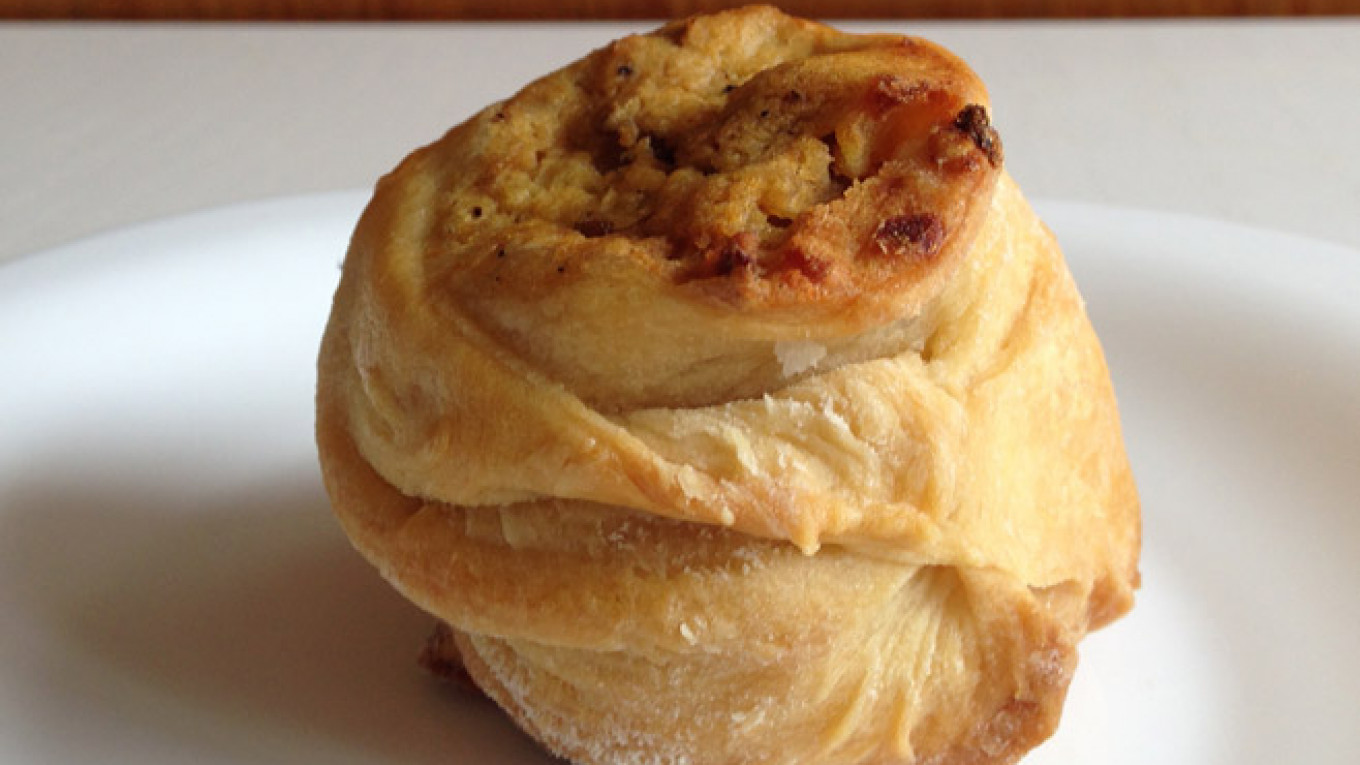You should think of the knish as Jewish soul food, according to cookbook writer Laura Silver, who spoke about it on Slate magazine's The Gist podcast last week. The knish, which has its origin in the Pale of Settlement — the part of Imperial Russia where Jews were allowed permanent residency — is indeed serious comfort food. It is, essentially, a packet of dough filled most often with caramelized onions and mashed potatoes: carbohydrates filled with more carbohydrates.
The exact origin of the knish is disputed, as is the name, which is pronounced "ka-NISH," not "kneesh" or "neesh." To our ears, the pronounced "k" sounds a little strange, but not if we take into account the word's origins: "Ukrainian, Polish, Yiddish, Russian — even German" all claim to be the source of 'knish,' according to Silver.
As to where the knish stands in comparison with the most well-known Jewish pastry, the bagel, Silver suggested that instead of being ubiquitous and "wonderbready" like the bagel (and its cinnamon-raisin iterations) the knish "has a little more self-respect."
Here's a recipe, then, for the most self-respecting of pastries, adapted from Smitten Kitchen, a blog that has the added bonus of being written by a New York Jewish mother.
Dough:
2 1/2 cups (312g) all-purpose flour
1 tsp baking powder
1/2 tsp table salt
1 large egg
1/2 cup (120 ml) vegetable oil
1 tsp white vinegar
1/2 cup (120 ml) water
Filling:
1 1/2 lbs (about 3 medium) russet potatoes, peeled and quartered
1 small yellow onion, peeled and diced small
1 tbsp vegetable or olive oil
1 tbsp unsalted butter
1/2 tsp table salt
Freshly ground black pepper
To finish
1 large egg yolk
1 tsp water
? ? ? •? ? ? First make the dough: Stir together the flour, baking powder and salt in a large bowl. Then whisk together the egg, oil, vinegar and water in a smaller bowl.
? ? ? •? ? ? Pour the wet ingredients over the dry ingredients and stir gently until mixed. Give it a good knead for a minute, then cover with plastic wrap and let rest for about an hour.
? ? ? •? ? ? To prepare the filling, put the potatoes in a large pot and cover with cold water. Boil the potatoes until soft and then drain and set aside in a large bowl.
? ? ? •? ? ? Meanwhile, put the oil and butter in a large frying pan and heat until it sizzles, then drop in the onions and cook over low heat for about 30 minutes until they are caramelized.
? ? ? •? ? ? Mash up the now-cool potatoes until almost smooth and add in the onions. Add salt and pepper to taste.
? ? ? •? ? ? Preheat your oven to 375° Fahrenheit (190° Celsius) and set aside a baking tray.
? ? ? •? ? ? Now prepare the knish: Divide the dough in half and on a well-floured surface roll the dough out into a thin sheet. For medium-sized knish, form a 2-inch log of filling on the bottom half of the dough. Roll the filling up from the bottom to top, keeping it all contained, until the filling has been wrapped twice in dough.
? ? ? •? ? ? Repeat the process with the second half of dough. Your knish will end up being about 3 inches across.
? ? ? •? ? ? Make indentations in the dough about every 3 or 3 1/2 inches along the dough and twist the dough at these points, as if you were making sausages.
? ? ? •? ? ? Snip the dough at each link and keep one side of each knish tightly sealed to form a proper base. The other end you can seal up too, if you like, though I think it's nice to leave a bit of potato-y filling open.
? ? ? •? ? ? Now, to bake: Arrange the knish on a baking tray and spread with a glaze of egg yolk and water. Bake for about 45 minutes until they are golden brown. You may need to rotate the baking tray at some point.
? ? ? •? ? ? The filling will be very hot, so let them cool and serve with mustard or sour cream.
Contact the author at s.crowther@imedia.ru
A Message from The Moscow Times:
Dear readers,
We are facing unprecedented challenges. Russia's Prosecutor General's Office has designated The Moscow Times as an "undesirable" organization, criminalizing our work and putting our staff at risk of prosecution. This follows our earlier unjust labeling as a "foreign agent."
These actions are direct attempts to silence independent journalism in Russia. The authorities claim our work "discredits the decisions of the Russian leadership." We see things differently: we strive to provide accurate, unbiased reporting on Russia.
We, the journalists of The Moscow Times, refuse to be silenced. But to continue our work, we need your help.
Your support, no matter how small, makes a world of difference. If you can, please support us monthly starting from just $2. It's quick to set up, and every contribution makes a significant impact.
By supporting The Moscow Times, you're defending open, independent journalism in the face of repression. Thank you for standing with us.
Remind me later.


